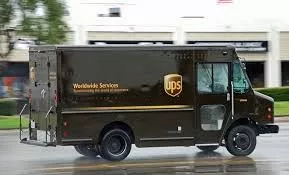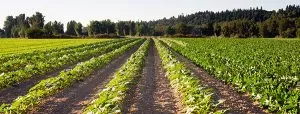“The big data boom is the innovation story of our time.”
That quote is from a story in the Atlantic nearly seven years ago. Yet it might as well have been made last month because we are finally watching big data transform industries from finance to health care. These and other industries which embrace big data will reap the rewards earlier than other industries that wait it out.
This means that not every industry will benefit from big data at the same time or rate. Advancements in processing, storage, and cloud technology have made it easier for businesses to use big data as a competitive tool than ever before. We are still on the cusp of mainstream adoption. Yet we have enough information to glean who might benefit the most from using big data, and that is what we will look at this week.  UPS deploys about 125,000 trucks, and big data has helped them determine that shaving a mile off each driver’s daily route results in an annual savings of $50 million. The same computers help reduce idle times which means fuel and operational savings of nearly $15 million a year. This savings goes directly to the bottom line.
Optimizing routes is not only reserved for large companies like UPS. Big data will help smaller companies optimize their fleets and routes too. Fluctuations in fuel costs present a challenge to this industry, so optimizing as much of their operations as possible will help them compete in a future of robotics and autonomous vehicles. This is an industry that is not accustomed to a lot of change, but they must embrace big data to remain competitive.
UPS deploys about 125,000 trucks, and big data has helped them determine that shaving a mile off each driver’s daily route results in an annual savings of $50 million. The same computers help reduce idle times which means fuel and operational savings of nearly $15 million a year. This savings goes directly to the bottom line.
Optimizing routes is not only reserved for large companies like UPS. Big data will help smaller companies optimize their fleets and routes too. Fluctuations in fuel costs present a challenge to this industry, so optimizing as much of their operations as possible will help them compete in a future of robotics and autonomous vehicles. This is an industry that is not accustomed to a lot of change, but they must embrace big data to remain competitive.  Big data and the structure it provides can provide healthcare providers with deep understanding of our medical history and call attention to trends and patterns not obvious to physicians. Understanding what treatment and drugs worked and which did not will help lead to healthier lives.
One example of how big data is helping improve lives is found in the documentary, Moonshot Through the Double Helix. This film follows several doctors and scientists from Stanford University and Intermountain Healthcare as they develop customized treatments for cancer patients using genetic sequencing technology. The scientists use big data to analyze millions of tumor samples dating back over 30 years to determine which genetic mutations will provide the most effective treatment.
Patient privacy will need to be protected (HIPPA) as more information is collected about us. It may take a few years, but the benefits of big data are too great to ignore.
Big data and the structure it provides can provide healthcare providers with deep understanding of our medical history and call attention to trends and patterns not obvious to physicians. Understanding what treatment and drugs worked and which did not will help lead to healthier lives.
One example of how big data is helping improve lives is found in the documentary, Moonshot Through the Double Helix. This film follows several doctors and scientists from Stanford University and Intermountain Healthcare as they develop customized treatments for cancer patients using genetic sequencing technology. The scientists use big data to analyze millions of tumor samples dating back over 30 years to determine which genetic mutations will provide the most effective treatment.
Patient privacy will need to be protected (HIPPA) as more information is collected about us. It may take a few years, but the benefits of big data are too great to ignore.  The most effective retail stores understand buying patterns and consumer behavior. Big data can help companies dive even deeper into both areas to predict future purchases. Big data will help brick and mortar stores analyze foot traffic through stores as well as malls and parking lots.
Understanding why a customer purchases some products in stores while making other purchases online is critical to a company’s growth. Analytics has aided in understanding the behavior of online shoppers for many years, but it analysis could take days or weeks. Big data, along with powerful computational computers, are now able to provide this level of detail in real-time.
Along with better understanding customer behavior, big data will help retailers personalize the online and in-person sales experience using mobile apps, sensors, and cameras. Amazon has already released their Echo Look fashion camera which uses machine learning to analyze your look and make recommendations that fit your style. It’s not hard to imagine a day when the camera on your phone performs the same action across all your favorite stores.
The most effective retail stores understand buying patterns and consumer behavior. Big data can help companies dive even deeper into both areas to predict future purchases. Big data will help brick and mortar stores analyze foot traffic through stores as well as malls and parking lots.
Understanding why a customer purchases some products in stores while making other purchases online is critical to a company’s growth. Analytics has aided in understanding the behavior of online shoppers for many years, but it analysis could take days or weeks. Big data, along with powerful computational computers, are now able to provide this level of detail in real-time.
Along with better understanding customer behavior, big data will help retailers personalize the online and in-person sales experience using mobile apps, sensors, and cameras. Amazon has already released their Echo Look fashion camera which uses machine learning to analyze your look and make recommendations that fit your style. It’s not hard to imagine a day when the camera on your phone performs the same action across all your favorite stores.  In addition to weather patterns, farmers are using big data to help predict pesticide levels, the health of livestock, and crop prices. One big challenge farms face is predicting feed levels for livestock. Using big data, farmers can ration just the right amount of feed for each type of animal. This helps save money and also results in healthier livestock.
Even small changes to large-scale agriculture projects have massive ramifications for the farmer, his fields, and livestock. Like healthcare, improvements to the food we eat affect each of us, and big data is making farmers more efficient in delivery their harvests.
In addition to weather patterns, farmers are using big data to help predict pesticide levels, the health of livestock, and crop prices. One big challenge farms face is predicting feed levels for livestock. Using big data, farmers can ration just the right amount of feed for each type of animal. This helps save money and also results in healthier livestock.
Even small changes to large-scale agriculture projects have massive ramifications for the farmer, his fields, and livestock. Like healthcare, improvements to the food we eat affect each of us, and big data is making farmers more efficient in delivery their harvests.
Transportation & Delivery
Companies like UPS and FedEx use big data to help determine the most efficient routes for their delivery drivers to navigate. For example, UPS uses computers around the clock to track over 24 million packages each day. The computers collect and analyze data collected by its drivers to determine the ideal delivery schedule. It also helps manage the UPS air fleet that handle millions of Next-Day delivery packages.
Healthcare
This is one of the most important industries big data can improve because it deals with the well-being of each of us. Consider the amount of information you provide your doctor during each visit. And yet when you move across town, that information does not necessarily follow.
Retail

Agriculture
Farming is an unforgiving practice that hinges on often unpredictable weather and climate changes. With small margins, the ability to predict such changes determines a farmer’s profit or loss for the season.
You May Also Like
- Uncategorized
Warum Cybersicherheitslösungen Ransomware nicht stoppen können und was Sie dagegen tun müssen
December 14th, 2021 - Uncategorized
Cyber Recovery im Vergleich zu Disaster Recovery: Gibt es einen Unterschied? Und warum ist dieser so wichtig?
December 7th, 2021